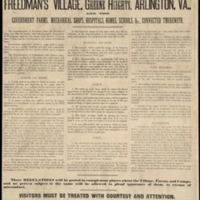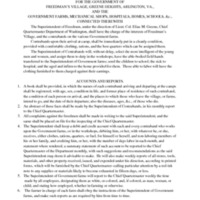Regulations for the Government of Freedman's Village, Greene Heights, Arlington, Va.
Dublin Core
Title
Subject
Description
Creator
Source
Publisher
Date
Contributor
Rights
Format
Type
Identifier
Coverage
Text Item Type Metadata
Text
REGULATIONS FOR THE GOVERNMENT OF FREEDMAN’S VILLAGE, GREENE HEIGHTS, ARLINGTON, VA., AND THE GOVERNMENT FARMS, MECHANICAL SHOPS, HOSPITALS, HOMES, SCHOOLS, &c., CONNECTED THEREWITH
The Superintendent of Freedmen, under the direction of Lieut. Col. Elias M. Greene, Chief Quartermaster Department of Washington, shall have the charge of the interests of Freedman’s Village, and the contrabands on the various Government farms.
Contrabands upon their arrival at camp, shall be immediately put in a cleanly condition, provided with comfortable clothing, rations, and the best quarters which can be assigned them.
The Superintendent of Contrabands will, without delay, select the most intelligent of the young men and women, and assign them to duty in the workshops; have the able-bodied field hands transferred to the Superintendent of Government farms; send the children to school; the sick to hospital; and the aged and infirm to the home provided for them. Those able to labor will have the clothing furnished to them charged against their earnings.
ACCOUNTS AND REPORTS.
- A book shall be provided, in which the names of each contraband arriving and departing at the camps shall be registered, with age, sex, condition in life, and former place of residence of such contraband, the condition of each person on arrival, and the places to which those who leave the village, or farms, intend to go, and the date of their departure; also the diseases, ages, &c., of those who die.
- An abstract of these facts shall be made by the Superintendent of Contrabands, in his monthly report to the Chief Quartermaster.
- All complaints against the freedmen shall be made in writing to the said Superintendent, and the same shall be placed on file for the inspecting of the Chief Quartermaster.
- The Superintendent shall keep a debit and credit account with each and every contraband who works upon the Government farms, or in the workshops, debiting him, or her, with whatever he, or she, receives, either clothes, rations, quarters, or fuel, for himself or herself, and non-laboring members of his or her family, and crediting him, or her, with the number of days labor in each month, and statement where rendered; a summary statement of such account to be reported to the Chief Quartermaster of the Department monthly, with such suggestions and recommendations as the said Superintendent may deem it advisable to make. He will also make weekly reports of all stores, tools, materials, and other property received, issued, and expended under his direction, according to printed forms, which will be furnished by the Chief Quartermaster–calling particular attention by a red-ink note to any supplies or materials likely to become exhausted in fifteen days, or less.
- The Superintendent of Government farms will report to the Chief Quartermaster weekly the time made by all employees, designating them as white, or colored, and, if colored, as man, woman, or child, and stating how employed, whether in farming or otherwise.
- The farmer in charge of each farm shall obey the instructions of the Superintendent of Government farms, and make such reports as are required by him from time to time.
HOSPITALS AND HOME.
- The hospital will be under the charge of the Surgeon, or Surgeons, assigned to that duty by the Medical Director of the Department of Washington, who will make proper regulations for the Government of the same.
- The superintendent of contrabands will keep on hand such necessary supplies, not furnished by the medical department, as may, in the opinion of the surgeon, be necessary for the care and comfort of the sick and infirm in the hospitals and home, and for the burial of the dead; and will make such reports in regard to said supplies, and take such precautions against their being exhausted as has been above prescribed in reference to other property and supplies.
LABOR.
- The labor on each farm shall be under the direct supervision of the farmer in charge of the same, subject to the discretion of the superintendent of Government farms.
- All the able-bodied men and women will be required to labor each day, either on the farms or in one of the mechanical shops, as their services may be required.
- All persons who would excuse themselves on the plea of disability must furnish to the superintendent a written declaration to that effect from the surgeon in charge.
- The hours of labor shall be, during the winter months, from 7, a.m., to 12 noon, and from 1 to 5, p.m.; from 7, a.m., to 12 noon, and from 1 to 6, p.m., in summer.
- In case able-bodied men or women refuse to work, their cases shall be promptly reported to the superintendent by the overseers of labor, who shall take such steps as will insure obedience to regulations.
SCHOOL.
- The educational and religious interests of the village shall be under the supervision of the American Tract Society. Their schools shall be conducted by proper teachers for children under 14 years of age, in day time opening 10 a.m., and closing as 12 noon; recommencing at 1 p.m., and closing at 4 p.m. No child under the age of fourteen years shall be detained from school, during the winter months, unless in case of sickness.
- An adult evening school shall be opened, for the benefit of the laborers on the farms and in the mechanical shops. The teachers shall require of each boy over 16, or girl over 14, a permit from the Superintendent, before he or she can be admitted to the day school; nor shall the Superintendent give such permit while their services are required in the labor department.
- No child old enough to be benefitted by school instruction will be permitted to absent himself or herself therefrom, without a written pass from the Superintendent of Contrabands; and in case a child is found out of school during school hours, without such pass, the guard will arrest and take the delinquent to school.
- The Superintendent of Contrabands will embody in his monthly report a statement of the condition of the schools, the number of pupils admitted and dismissed during the month, the average attendance, and such other information, statistical and otherwise, as it may, in his judgment, be necessary to communicate to the Chief Quartermaster.
POLICE REGULATIONS.
- The camps and village shall be daily policed and inspected, under the direction of the Superintendent of Contrabands.
- Inspection reports shall be submitted to the Chief Quartermaster by the said Superintendent, with his regular monthly report.
- The buildings and other public property must be kept in good order, and not defaced; and no injury to the walks, enclosures, or shrubbery will be allowed.
- Proper precautions must be taken to remove filth from the vicinity of the camps; and any accumulation, likely, in the opinion of the surgeon in charge, to endanger the health of the occupants, will subject the person responsible for such accumulation to instant dismissal.
- Inmates of the camps, who have voluntarily left the same for service outside, will not be re-admitted, without submitting to the Superintendent evidence that they have been treated cruelly or unjustly by their employer or employers, or that they have been defrauded, or that there is an intention to defraud them, out of their earnings.
PUNISHMENTS.
- Punishments shall be of three grades: In mild offences it shall be a reproof from the officer in charge of the delinquent; in cases of idleness or disposition to shrink from labor, or untidiness or uncleanliness in person or habitation, the one so offending shall be deprived of his or her ration of sugar for the next five days, and also be deprived of all passes from the camp during that time.
- In case a person refused obedience to orders, or is guilty of drunkenness, or theft, or any gross offence, the person so offending shall be tried by a commission, consisting of the Superintendent, the Captain commanding the guard detachment, the Superintendent of the Educational and Religious interests, and the Surgeon in charge, and such a punishment administered as the said commission shall designate, of deprivation of privileges, fine, or imprisonment in guardhouse, after the sentence has been submitted to the Chief Quartermaster of the Department of Washington, for his approval.
- No brutality or violence towards the inmates of the camp will be allowed, and no punishment administered, except as provided for above.
VISITORS MUST BE TREATED WITH COURTESY AND ATTENTION.
ELIAS M. GREEN, Lt. Col., Chief Quartermaster Dep’t of Washington.
PHILP & SOLOMONS, Printers and Stationers, Washington D. C.

